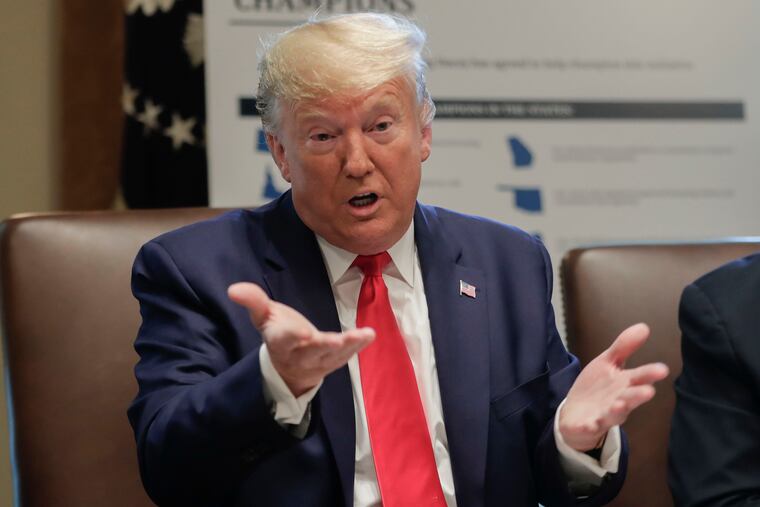Trump says U.S. will lift sanctions on Turkey, calling cease-fire in Syria ‘permanent’
President Donald Trump announced Wednesday that the United States will lift sanctions on Turkey, saying that the Turkish government has informed the White House that it will abide by what he characterized as a "permanent" cease-fire along the border with Syria.

WASHINGTON - President Donald Trump announced Wednesday that the United States will lift sanctions on Turkey, saying that the Turkish government has informed the White House that it will abide by what he characterized as a “permanent” cease-fire along the border with Syria.
At a hastily organized event in the Diplomatic Reception Room of the White House, Trump also used the occasion to justify his "America First" foreign policy agenda, pushing back against critics by arguing that he is removing U.S. troops from a region where they should not be involved.
"Let someone else fight over this long-bloodstained sand," Trump said.
He took credit for the cease-fire and suggested the agreement would save tens of thousands of Kurdish lives in the region - even though one day earlier, Russia and Turkey agreed to a plan to push Syrian Kurdish fighters from a wide swath of territory just south of Turkey's border, cementing Russian President Vladimir Putin's preeminent role in Syria as American troops depart and U.S. influence wanes.
The agreement will leave Turkey and Russia in control of territory formerly held by Kurdish forces once allied with the United States.
The Trump administration had announced the sanctions on Oct. 14 after the Turkish military offensive against Kurdish-led forces in northern Syria. That offensive followed Trump's announcement that he would pull U.S. troops from Syria - a decision that brought stiff, bipartisan criticism.
In his remarks Wednesday, Trump called the cease-fire "permanent" but added that the word is a "questionable" one to use when discussing the region - and said sanctions on Turkey would be lifted "unless something happens that we're not happy with."
Trump also said he had spoken by phone with Kurdish general Mazloum Abdi, who he said assured him that Islamic State fighters will remain in captivity.
"A few got out, a small number," Trump said, adding that some have been recaptured, despite statements from other administration officials to the contrary.
And in a sign of tensions between Trump and leaders of the Republican Party, Trump suggested that he remains open to a potential White House visit by Turkish President Recep Tayyip Erdogan next month - despite a resolution introduced by Senate Majority Leader Mitch McConnell, R-Ky., on Tuesday urging him to rescind the invitation until a genuine cease-fire is reached.
"In his mind, he's doing the right thing for his country, and we may be meeting in the very near future," Trump said of Erdogan.
Trump has been harshly criticized by members of both parties over his decision earlier this month to withdraw U.S. troops from northeastern Syria, with many arguing that Trump gave Erdogan the green light to launch a military offensive against the Syrian Kurds.
On Wednesday, lawmakers similarly denounced Trump's decision to lift sanctions.
Senate Minority Leader Chuck Schumer, D-N.Y., called Trump's announcement "another nonsensical and counterproductive foreign policy decision" that "includes no plan to ensure the enduring defeat of ISIS."
"The notion that the United States should trust Turkey, which has already showed a willingness to ignore President Trump, to now secure ISIS fighters and sympathizers is delusional and dangerous," Schumer said in a statement. "President Trump's weakness in the face of strongmen and his reckless decision-making is putting the lives of our allies, Americans, and our national security at risk."
Rep. Liz Cheney of Wyoming, the third-ranking Republican in the House, tweeted that the U.S. withdrawal "enables the resurgence of ISIS."
"ISIS is a threat to the American homeland. Retreating and putting our security in the hands of Assad, Putin & Erdogan strengthens our enemies, weakens America, and makes us less safe," she said.
But in a tweet Wednesday morning, Trump proclaimed that the situation on the Turkey-Syria border was a "big success."
"Safe Zone created!" Trump said. "Ceasefire has held and combat missions have ended. Kurds are safe and have worked very nicely with us. Captured ISIS prisoners secured."
Even as Trump declared success in Syria, U.S. policy appeared to be in disarray. Defense Secretary Mark Esper was in the Iraqi capital to discuss the redeployment of hundreds of U.S. troops after Iraq's military announced its opposition to allowing American forces to stay in the country.
And at a Senate hearing Tuesday, James Jeffrey, the administration's special envoy for Syria, was upbraided by lawmakers, who dismissed his insistence that U.S. goals in Syria - to prevent an Islamic State resurgence, to remove President Bashar Assad's Iranian allies from the country and to establish a working democracy in the country - remained intact.
Some, such as Sen. Marco Rubio, R-Fla., noted reports of Islamic State prisoners escaping from Kurdish-run prisons in Syria and the potential for militants to seize Syrian oil fields.
Others, such as Sen. Robert Menendez, D-N.J., said the Trump administration's claim of victory was off the mark.
“I have the greatest respect for you,” Menendez told Jeffrey, "but one can try to put lipstick on a pig but it’s still a pig. One can try to call capitulation a victory, and it’s still capitulation.